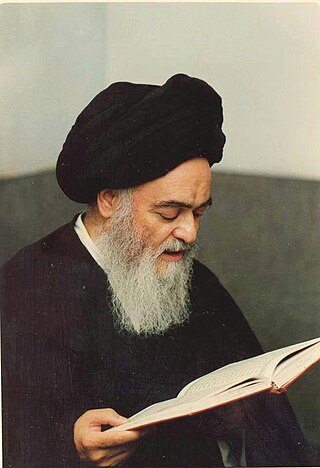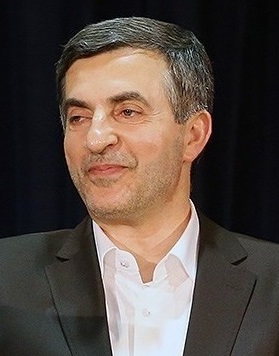Table of marjas and their published stance
This table was taken directly from the List of marjas, with some columns removed and a new one added.
The names are ordered alphabetically.
Following the 2009 presidential election in Iran, various marjas (a religious authority for which the title Grand Ayatollah is given) have made statements concerning the controversies surrounding the election.
This table was taken directly from the List of marjas, with some columns removed and a new one added.
The names are ordered alphabetically.
Ali Hosseini Khamenei initially confirmed the election, but later ordered a probe. [6]
Several Marjas have made official statements about the controversies surrounding the 2009 Iranian presidential election. In addition to the statements made by the Marjas
(Translated, [7] from his official website [ permanent dead link ])
In the name of God
People of Iran
These last days, we have witnessed the lively efforts of you brothers and sisters, old and young alike, from any social category, for the 10th presidential elections.
Our youth, hoping to see their rightful will fulfilled, came on the scene and waited patiently. This was the greatest occasion for the government's officials to bond with their people.
But unfortunately, they used it in the worst way possible. Declaring results that no one in their right mind can believe, and despite all the evidence of crafted results, and to counter people protestations, in front of the eyes of the same nation who carried the weight of a revolution and 8 years of war, in front of the eyes of local and foreign reporters, attacked the children of the people with astonishing violence. And now they are attempting a purge, arresting intellectuals, political opponents and Scientifics.
Now, based on my religious duties, I will remind you:
1- A legitimate state must respect all points of view. It may not oppress all critical views. I fear that this leads to the loss of people's faith in Islam.
2- Given the current circumstances, I expect the government to take all measures to restore people's confidence. Otherwise, as I have already said, a government not respecting people's vote has no religious or political legitimacy.
3- I invite everyone, specially the youth, to continue reclaiming their dues in calm, and not let those who want to associate this movement with chaos succeed.
4- I ask the police and army personals not to "sell their religion", and beware that receiving orders will not excuse them before god. Recognize the protesting youth as your children. Today censor and cutting telecommunication lines can not hide the truth.
I pray for the greatness of the Iranian people.
While not Marjas themselves, several influential Ayatollahs have made statements regarding the 2009 Iranian elections.
Grand Ayatollah Yousef Sanei and Grand Ayatollah Asadollah Bayat Zanjani wrote letters to the Iranian news web site Emrooz in support of the protestors, with Ayatollah Zanjani referring to the election as a "gross injustice," [8] [9]

Seyyed Ali Hosseini Khamenei is an Iranian Twelver Shia marja' and politician who has been the second supreme leader of Iran since 1989. He previously served as third president of Iran from 1981 to 1989. Khamenei is the longest-serving head of state in the Middle East, as well as the second-longest-serving Iranian leader of the last century, after Shah Mohammad Reza Pahlavi.

Grand Ayatollah Hussein-Ali Montazeri was an Iranian Shia Islamic theologian, Islamic democracy advocate, writer and human rights activist. He was one of the leaders of the Iranian Revolution and one of the highest-ranking authorities in Shīʿite Islam. He was once the designated successor to the revolution's Supreme Leader, Ayatollah Khomeini, but they had a falling-out in 1989 over government policies that Montazeri claimed infringed on people's freedom and denied them their rights, especially after the 1988 mass execution of political prisoners. Montazeri spent his later years in Qom and remained politically influential in Iran, but was placed in house arrest in 1997 for questioning "the unaccountable rule exercised by the supreme leader", Ali Khamenei, who succeeded Khomeini in his stead. He was known as the most knowledgeable senior Islamic scholar in Iran and a grand marja of Shia Islam. Ayatollah Montazeri was said to be one of Khamenei's teachers.

Ali al-Husayni al-Sistani is an Iraqi Islamic scholar. One of the most senior scholars of Twelver Shia with the rank of Grand Ayatollah and marja', he has been described as the spiritual leader of Shia Muslims worldwide, "the undisputed leader of Iraq's Shias", included in top positions of "The Muslim 500: The World's Most Influential Muslims", from 2009 to 2023, and named one of the 100 most influential people in the world by Time magazine in 2004 and 2005.

Grand Ayatollah Sayyid Muhammad al-Husayni al-Shirazi, commonly known as Imam Shirazi, was an Iranian-Iraqi Shia marja' and political activist.

Sayyid Mohammad Kazem Shariatmadari, also spelled Shariat-Madari, was an Iranian Grand Ayatollah. He favoured the traditional Shiite practice of keeping clerics away from governmental positions and was a critic of Supreme Leader Ruhollah Khomeini, denouncing the taking hostage of diplomats at the US embassy in Tehran.

Grand Ayatollah Yousef Saanei was an Iranian Twelver Shi'a Marja' and politician, a member of the Islamic Republic of Iran's powerful Guardian Council from 1980 to 1983 and also Attorney-General of Iran from 1983 to 1985.

Grand Ayatollah Naser Makarem Shirazi is an Iranian Shia marja' and religious leader.

Grand Ayatollah Hossein Noori-Hamedani is an Iranian Twelver Shi'a Marja known for his conservative views.

Grand Ayatollah Sheikh Hossein Wahid Khorasani is an Iranian author and Shia marja'.

Grand Ayatollah Sayyid Sadiq al-Hussayni al-Shirazi is an Iraqi-Iranian Shia marja'.

The Society of Seminary Teachers of Qom is an Iranian group founded in 1961/3 by the leading Muslim clerics of Qom. Established by the students of Ayatollah Khomeini after his exile to Iraq, it was formed in order to organize political activities of Khomeini's followers and promote his revolutionary interpretation of Islam, such as the idea of Islamic government. Since the 1979 revolution, it has largely become the body to keep the regime's registrar of who counts as a grand ayatollah, an ayatollah and a hojjat ul Islam. It has a head who is appointed by the Supreme Leader of the Islamic Republic. It currently heads the Supreme Council of Qom Hawzas, and proposes judges to the judiciary system. The body gained international prominence when it announced in 1981 that Ayatollah Shariatmadari was no longer a source of emulation (marja'). It has demoted a number of clerics over the last three decades. A recent case was that of Ayatollah Yousef Saanei, who for his solidarity with the green movement was demoted from marja' to hojatoleslam. The society also includes Ayatollah Sistani on its list.

After incumbent president Mahmoud Ahmadinejad declared victory in the 2009 Iranian presidential election, protests broke out in major cities across Iran in support of opposition candidates Mir-Hossein Mousavi and Mehdi Karroubi. The protests continued until 2010, and were titled the Iranian Green Movement by their proponents, reflecting Mousavi's campaign theme, and Persian Awakening, Persian Spring or Green Revolution.

Grand Ayatollah Asadollah Bayat-Zanjani is an Iranian theologian, Islamic philosopher, writer and Grand marja of Islam. He has published objections to Iran's system of Islamic Jurist Guardianship known as velayat-e faqih, asserting that this system is not founded on Islam.

Esfandiar Rahim Mashaei is an Iranian conservative politician and former intelligence officer. As a senior Cabinet member in the administration of President Mahmoud Ahmadinejad, he served as Chief of Staff from 2009 to 2013, and served as the fourth first vice president of Iran for one week in 2009 until his resignation was ordered by Supreme Leader Ayatollah Ali Khamenei.

The Ashura protests were a series of protests which occurred on 27 December 2009 in Iran against the outcome of the June 2009 Iranian presidential election, which demonstrators claim was rigged. The demonstrations were part of the 2009 Iranian election protests and were the largest since June. In December 2009, the protests saw an escalation in violence.

The Qom Seminary is the largest Islamic seminary (hawza) in Iran, established in 1922 by Grand Ayatollah Abdul-Karim Haeri Yazdi in Qom. It trains Usuli scholars.

Ayatollah Sayyid Radhi al-Husayni al-Shirazi, also known as Razi Shirazi, was an Iraqi-Iranian Shia who was a jurist, philosopher and theologian. He was the great-grandson of the renowned Shia jurist, Mirza Shirazi, the pioneer of the Tobacco protest. He was the Imam of the Shifa mosque in Yousefabad.
Nimr Baqir al-Nimr was a Shia cleric and critic of the government in Saudi Arabia, who was beheaded on 2 January 2016, one of 47 people executed that day for terrorism offenses. Others executed included Sunnis who had been convicted of involvement in terror attacks linked to al-Qaeda which took place in 2003. News of the killings triggered international demonstrations, and condemnation by nations, supranational organizations, and human rights groups.
Marja' is a title given to the highest level of Twelver Shia religious cleric, with the authority given by a hawzah to make legal decisions within the confines of Islamic law for followers and clerics below him in rank. The highest ranking marjiʿ is known as the marja al-mutlaq or marja al-taqlid al-mutlaq. A marji' is also, or usually is also, a grand ayatollah.
Ayatollah Sayyid Hussein al-Husayni al-Shirazi is an Iraqi-Iranian Twelver Shia cleric. He is a son of Grand Ayatollah Sadiq al-Shirazi. He is currently the head of his father's office and is residing in Qom, Iran.
{{cite web}}: CS1 maint: bot: original URL status unknown (link) News Agency, 2009 July 22.